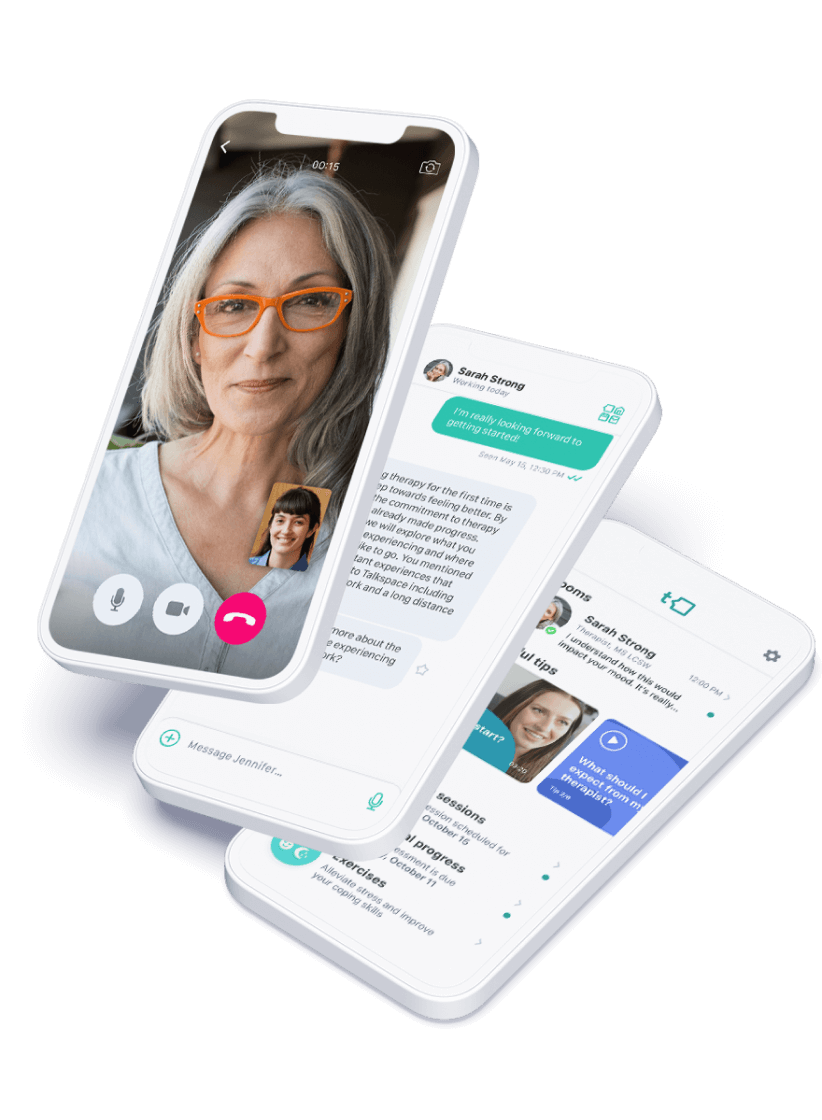Anxiety Disorder
Read Time: 5 MinutesUpdated On: August 26, 2024
Overview
Anxiety can have a profound impact on your quality of life. It can interfere with relationships, how you function at work, your sense of self-worth, and even your ability to complete everyday activities. In short, anxiety causes a persistent, pervasive sense of worry and nervousness that can affect virtually every aspect of your life. It’s not just a mental health issue, either — anxiety can manifest as physical symptoms, too. The good news is that learning effective anxiety coping skills can help.
Keep reading to explore coping mechanisms for anxiety grounded in research and practical experience. With the right tools, you can regain control over your emotions and lead a more balanced life.
15 Skills for Coping with Anxiety
Anxiety can be all-consuming. It can overshadow your daily experiences and steal some of the joy you get out of life. When you learn the right coping skills for anxiety, though, you’ll be able to effectively manage anxiety triggers and symptoms to enhance your overall mental well-being.
1. Seek professional support
Getting professional support for your anxiety can be the game-changer you’ve been searching for. Research shows that therapy is a highly effective anxiety treatment — a recent meta-analysis looked at 10 studies with 1250 participants in total and found that cognitive behavioral therapy (CBT) can successfully treat anxiety.
A qualified mental health professional can offer personalized strategies and anxiety coping skills targeting your specific symptoms. Therapy can help you identify the root cause of your anxiety so you can find the best tools to manage it.
TIPS:
- Find a therapist you connect with and trust.
- Look for someone who specializes in therapy for anxiety.
- Ask about their process and the types of therapeutic methods they use.
2. Practice mindfulness meditation
Mindfulness meditation involves staying present and being engaged in the moment without judgment. Meditating is a coping skill that teaches you to manage stress and reduce the intensity and frequency of anxious thought processes.
Over time, meditation can help you find a state of calm, even when anxiety starts to creep in. In studies, meditation had a positive effect on symptoms in people with generalized anxiety disorder (GAD).
TIPS:
- Guided meditation can be helpful if you have difficulty focusing on your own.
- Use an app to get started if you find the process hard.
- Start with short sessions — even 5 – 10 minutes — and gradually increase them as you become better in your practice.
3. Utilize grounding exercises for immediate relief
Grounding exercises can distract your mind from anxious thoughts by intensely focusing on the present. They can be incredibly beneficial coping strategies for anxiety, especially if you have panic attacks or severe episodes.
There are several effective grounding techniques for anxiety, including the 5-4-3-2-1 sensory method, physical grounding, diaphragmatic breathing, and more. Which one works best for you will depend on personal preference and the type of anxiety you’re experiencing.
TIPS:
- 5-4-3-2-1 sensory method: Slowly identify things from each of the senses — notice what you can hear, taste, touch, see, and smell.
- Physical grounding: Hold a piece of ice to shift your focus and redirect your thoughts.
- Diaphragmatic breathing: Inhale slowly until you feel your stomach rise as you fill your lungs, then slowly exhale through your mouth.
4. Practice deep breathing exercises
Deep breathing is a coping skill that can counter the body’s instinctual fight-or-flight response, which is a natural reaction to anxiety. Studies have found that deep breathing triggers a relaxation response, enhances emotions, and reduces stress and depression, making the technique an excellent coping mechanism for anxiety. There are several types of deep breathing exercises for anxiety you can try.
TIPS:
- 4-7-8 breathing: Count to 4 while breathing in through your nose. Hold your breath for 7 seconds, then exhale slowly through your mouth as you slowly count to 8. Repeat.
- Mindful breathing: Inhale and exhale using slow, deep breaths while focusing on one thing — your breathing, a sound, something hanging on the wall. If your mind wanders, gently redirect it back. Relax and appreciate the moment.
- Alternate nostril breathing: Close one nostril with your fingers. Deeply inhale through the open nostril. After holding your breath for a second, exhale, cover the opposing nostril, and repeat.
5. Use progressive muscle relaxation
Progressive muscle relaxation (PMR) involves tensing and relaxing muscle groups one at a time. It’s particularly beneficial for sleep anxiety because it promotes relaxation and can improve sleep quality. In studies, participants saw a significant decrease in anxiety after using PMR.
TIPS:
- Look for guided sessions in a meditation app or online.
- Start at the top of your body and slowly work your way down.
- Address individual muscle groups, one at a time as you go, progressing from one end of the body to the other.
- Inhale, tense a muscle group, hold for 5 seconds, and then exhale, allowing muscles to fully relax for 10 – 20 seconds before moving on.
6. Engage in regular physical exercise
Physical exercise is one of the best coping strategies for anxiety you can use. Working out releases endorphins that act as mood elevators and can thwart anxiety symptoms.
Research shows that regular activity can improve physical and mental health. It reduces anxiety and depression and can improve self-confidence while being a distraction from anxious thought patterns.
TIPS:
- Any exercise is beneficial — from walking or cycling to intense workouts like running.
- Aim for light to moderate exercise, for at least 30 minutes, most days of the week.
- Find a workout buddy or group to help you stay motivated.
7. Maintain a healthy diet
Eating a well-balanced diet can have a positive impact on mood, energy levels, anxiety, and depression. Drinking enough water is also essential since dehydration, according to research, can cause a shift in mood and an increase in anxiety.
TIPS:
- Avoid high-sugar and highly processed foods.
- Incorporate anxiety-reducing foods into your diet — whole grains, omega-3-rich foods like salmon, and leafy greens are all great.
- Eat regular meals to prevent sharp drops in blood sugar.
8. Get adequate sleep
Anxiety is a known sleep disruptor, and it can become a vicious cycle — lack of sleep increases anxiety symptoms, and anxiety can cause insomnia, according to the American Psychological Association (APA).
Try to get 7 to 9 hours of quality sleep every night. Establishing a calm and consistent bedtime routine can help if you struggle to wind down in the evenings.
TIPS:
- Go to bed and get up at the same time every day (yes, even on weekends).
- Keep your bedroom calm, dark, and quiet.
- Limit screen time or stimulating activities at least 1 hour before bed.
- Try sleep aids like white noise machines or blackout curtains.
- Listen to a guided meditation as you fall asleep.
9. Challenge negative thoughts
Anxiety often stems from a pattern of unhealthy, unhelpful thought processes. Spotting and challenging those thoughts can help you manage and overcome stress. Cognitive behavioral therapy (CBT) is particularly effective in identifying and altering negative thought and behavior patterns that might be contributing to your anxiety.
“Several exercises that are helpful for coping with anxiety include visualization techniques that focus your mind on relaxing things, progressive muscle relaxation to help release muscle tension, deep breathing exercises that change the stress response to a relaxation response, and mindfulness exercises such as meditation.”
Expert Insight
 LCSW, Doctorate of Social Work (DSW) Olga Molina
LCSW, Doctorate of Social Work (DSW) Olga Molina
TIPS:
- Keep a thought diary to track patterns or triggers that cause you anxiety.
- Have coping skills in place to use when you notice or encounter a trigger.
- Reframe your thoughts into more positive perspectives.
- Use positive affirmations each day to put your brain in a positive mindset.
10. Use journaling as a coping tool
Writing in a journal can help clear your mind and let go of anxious thoughts. Journaling for anxiety can also help you pinpoint the source of your stress so you can develop coping tools to manage it. It’s effective, too — studies have found that journaling can effectively mitigate the mental distress anxiety can cause.
TIPS:
- Use structured prompts if you find it hard to start writing.
- Focus on gratitude or problem-solving.
- Review past entries to look for insight into patterns.
- Make the practice a regular habit.
11. Identify and reduce stressors in your life
Exploring stressors in your life is the first step in managing your anxiety. As you find things that cause you stress, you can discover strategies to avoid them or drastically reduce their impact.
TIPS:
- Simplify your schedule.
- Delegate tasks.
- Set and enforce clear boundaries.
- Learn the power of saying no.
- Practice acts of self care.
12. Explore aromatherapy for relaxation
Aromatherapy uses essential oils to promote relaxation and enhance well-being. Lavender, chamomile, rose, and countless other scents are all known for their anti-anxiety properties. Try using essential oils for anxiety to create a calming atmosphere that helps you feel less overwhelmed when stressed.
TIPS:
- Run a diffuser with your favorite scent.
- Burn scented candles.
- Use topical applications or roller balls to reduce stress.
13. Practice self-compassion
To practice self-compassion, treat yourself with the kindness you’d offer a friend in need. Self-compassion requires recognizing that there’s no such thing as perfection and that it’s OK to make mistakes. It can help you manage anxious feelings by adopting a gentle perspective and reducing harsh self-judgment.
TIPS:
- Use anxiety affirmations.
- Become aware of negative self-talk.
- Focus on a positive perspective.
- Cut toxic environments and relationships out of your life.
14. Establish a consistent routine
According to some research, repetitive and predictable routines are great coping tools for anxiety. Consistent daily routines offer a sense of predictability and control. Structuring your days ensures you have time for essential tasks and things that bring you joy, reducing anxiety and feelings of being overwhelmed.
Creating balance is critical for your mental well-being; a routine can help you find that harmony.
TIPS:
- Set goals by identifying what you want to accomplish and then breaking large tasks into smaller, more achievable ones.
- Make a plan that works with your schedule.
- Set reminders on your phone if you lose track of time throughout the day.
- Prioritize tasks with to-do lists and focus on the most critical things first.
- Track your progress and reward yourself often.
15. Limit caffeine and alcohol intake
Caffeine and alcohol can exacerbate symptoms of anxiety. Caffeine is a stimulant that raises your heart rate and can cause feelings of nervousness. Although alcohol is a depressant, that doesn’t mean it’s an effective way to reduce anxiety. It can impact your sleep pattern and mood stability when used in excess.
TIPS:
- Don’t drink coffee or other caffeinated drinks in the late afternoon or at night.
- Try switching to decaf or half-caffeinated beverages.
- Limit your intake of alcohol to see if symptoms improve.
Finding Support and Expanding Your Coping Toolbox
Having and using effective coping skills for anxiety is a critical part of your treatment plan. However, if the tools you have in place aren’t offering you enough relief, or if you feel like you need more support, know that you’re not alone on your journey.
Talkspace is an online therapy platform that offers flexibility and accessibility as you work with qualified mental health professionals who can help you learn to deal with your anxiety in healthy ways. Combining coping skills you already have with additional professional guidance is a comprehensive approach to managing your anxiety and improving your overall well-being.
Reach out to Talkspace to start online treatment for anxiety.
See References
-
Efficacy of Cognitive Behavioral Therapy for Anxiety-Related Disorders: A Meta-Analysis of Recent Literature
Bhattacharya S, Goicoechea C, Heshmati S, Carpenter JK, Hofmann SG. Current Psychiatry Reports/Current Psychiatry Reports. 2022;25(1):19-30. doi:10.1007/s11920-022-01402-8. Accessed June 16, 2024.
-
Randomized controlled trial of mindfulness meditation for generalized anxiety disorder
Hoge EA, Bui E, Marques L, et al. Journal of Clinical Psychiatry/the Journal of Clinical Psychiatry. 2013;74(08):786-792. doi:10.4088/jcp.12m08083. Accessed June 16, 2024.
-
The effect of diaphragmatic breathing on attention, negative affect and stress in healthy adults
Ma X, Yue ZQ, Gong ZQ, et al. Frontiers in Psychology. 2017;8. doi:10.3389/fpsyg.2017.00874.
-
Progressive muscle relaxation to decrease anxiety in clinical simulations
Carver ML, O’Malley M. Teaching and Learning in Nursing. 2015;10(2):57-62. doi:10.1016/j.teln.2015.01.002. Accessed June 16, 2024.
-
The effects of physical exercise on anxiety symptoms of college students: A meta-analysis
Lin Y, Gao W. Frontiers in Psychology. 2023;14. doi:10.3389/fpsyg.2023.1136900. Accessed June 16, 2024.
-
Drinking plain water is associated with decreased risk of depression and anxiety in adults: Results from a large cross-sectional study
Haghighatdoost F, Feizi A, Esmaillzadeh A, et al. World Journal of Psychiatry. 2018;8(3):88-96. doi:10.5498/wjp.v8.i3.88. Accessed June 16, 2024.
-
Sleep deprivation makes us less happy, more anxious
https://www.apa.org. Published December 21, 2023.
-
Online Positive Affect Journaling in the Improvement of Mental Distress and Well-Being in General medical patients with Elevated Anxiety Symptoms: a preliminary randomized controlled trial
Smyth JM, Johnson JA, Auer BJ, Lehman E, Talamo G, Sciamanna CN. JMIR Mental Health. 2018;5(4):e11290. doi:10.2196/11290. Accessed June 16, 2024.
-
The effect of aromatherapy on anxiety in patients
Barati F, Nasiri A, Akbari N, Sharifzadeh G. Nephro-urology Monthly. 2016;8(5). doi:10.5812/numonthly.38347. Accessed June 16, 2024.
-
Accessed June 16, 2024. Why routines are really good for your health
Piedmont Healthcare. Accessed June 16, 2024.

Olga Molina is a licensed clinical social worker with approximately 40 years practice experience with diverse populations offering individual, family, and group counseling. Her research and publications focus primarily on divorce, intimate partner violence (women and children), African American and Latinx families, group work, and social work education. Dr. Molina has been in academia for approximately 20 years teaching at the undergraduate and graduate levels on clinical practice with families and groups, and culturally competent practice.
Related Articles About Anxiety Disorder
View all articles
Overcoming Parental Anxiety: Strategies for a Calmer Mind

15 Effective Coping Skills for Anxiety

Acupuncture for Anxiety: Does it Work?

Does Alcohol Cause Anxiety? Exploring the Connection

Agoraphobia vs Social Anxiety Disorder: What’s the Difference?

13 Best Jobs for People with Social Anxiety

Election Anxiety: How to Cope With Political Stress

Social Anxiety vs Autism: How to Tell the Difference

Anxiety & Fatigue: Exploring Why Anxiety Makes You Tired


